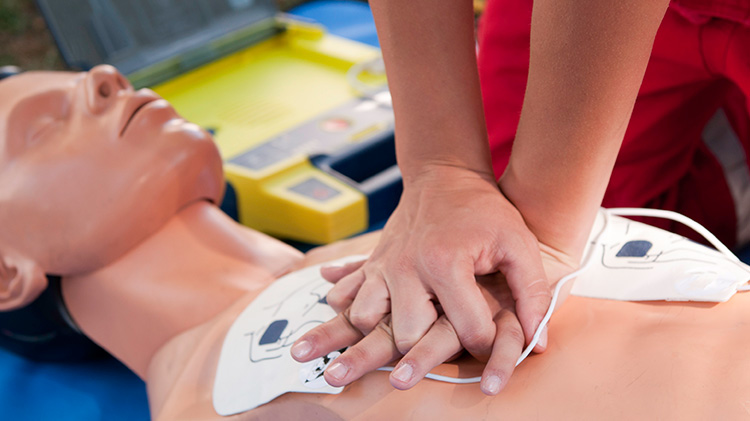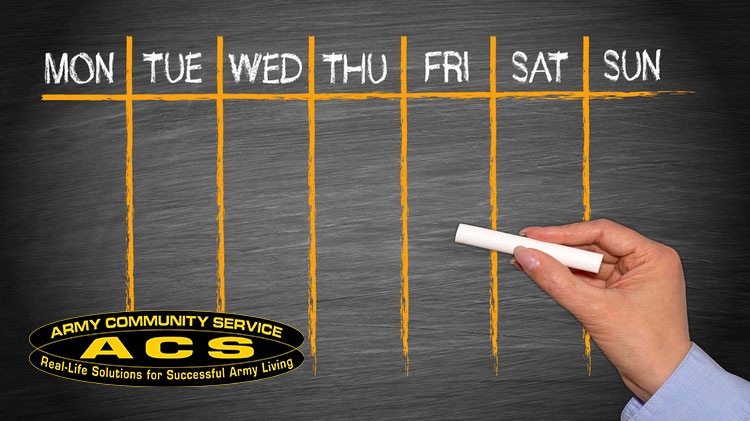- CONUS: +1(800)342-9647
- OCONUS: 00-800-3429-6477
- To call collect with operator assistance OCONUS: +1(484) 530-5908
- Classes & Happenings
-
Click here to view ACS classes and events
- What if I already have children?
-
You don’t have to be a new parent to participate in the program! Military Families that are pregnant or with children up to age three (36 months) are eligible for NPSP services. Family Advocacy offers classes to parents with children of all ages. If you already have children, and you would require childcare for your other kids in order to attend one of these classes, contact us. We offer free childcare vouchers for CYS Child Development Centers (CDC)! Sign up two weeks prior to the class.
- What can NPSP do for me?
-
- 1-Hour Home Visits: Our professional staff provides supportive and caring services to military families that are pregnant or with children up to age three (36 months). They can talk about your concerns as a parent or parent-to-be, and help you learn to cope with stress, isolation, post deployment reunions, and the everyday demands of parenthood in the privacy of your home.
- Play Mornings: Available on Fort Liberty/Pope Neighborhood Centers and Linden Oaks in Cameron. An interactive playgroup to assist parents in learning developmentally appropriate play techniques and to help children improve their social, cognitive, and motor skills. Structured activities include singing and dancing, story time, a craft project, and free play time. No registration required, but must provide child(ren)’s immunization record(s).
- 0 to 1 Baby Fun Play Mornings: Babies are born ready to learn and you can help! This fun, interactive class will show you how babies think, feel, and learn, and how you can make everyday parenting moments count. For parents with a baby ages birth to 12 months. Limited childcare available for older siblings, please call for information.
- What are the signs of child abuse or neglect?
-
- Consider the possibility of neglect when the child:
Is frequently absent from school, begs or steals food or money, lacks needed medical or dental care, immunizations, or glasses, is consistently dirty and has severe body odor, lacks sufficient clothing for the weather, abuses alcohol or other drugs, states that there is no one at home to provide care. - Consider the possibility of emotional maltreatment when the child:
Shows extremes in behavior, such as overly compliant or demanding behavior, extreme passivity, or aggression; is either inappropriately adult (parenting other children, for example) or inappropriately infantile (frequently rocking or head-banging, for example); is delayed in physical or emotional development; has attempted suicide; or reports a lack of attachment to the parent. - Consider the possibility of emotional maltreatment when the parent or other adult caregiver:
Constantly blames, belittles, or berates the child, is unconcerned about the child and refuses to consider offers of help for the child’s problems, overtly rejects the child. - Consider the possibility of sexual abuse when the child:
Has difficulty walking or sitting, suddenly refuses to change for gym or to participate in physical activities, reports nightmares or bed wetting, experiences a sudden change in appetite, demonstrates bizarre, sophisticated, or unusual sexual knowledge or behavior, becomes pregnant or contracts a venereal disease (particularly under the age of 14), runs away, reports sexual abuse by a parent or another adult caregiver, attaches very quickly to strangers or new adults in their environment - Consider the possibility of sexual abuse when the parent or other adult caregiver:
Is unduly protective of the child or severely limits the child’s contact with other children, especially of the opposite sex, is secretive and isolated, is jealous or controlling with family members.
- Consider the possibility of neglect when the child:
- What can I do to stop child abuse in a public place and to report suspected abuse?
-
Reporting abuse or neglect can protect a child and get help for a family—it may even save a child’s life. In North Carolina, any person who suspects child abuse or neglect is required to report. You should note as much detail as possible about the situation, including but not limited to a description of the incident, individuals involved, ages of the children, even license plate numbers.
- On post, immediately call the Fort Liberty Military Police at +1 (910)396-0391
- Off post, call 911
For additional information, call us or Family Member Behavioral Health at +1 (910)907-7869.
- Additional Resources
-
- Cumberland County Department of Social Services: +1 (910)677-2450
- Military One Source: +1 (800)342-9647 (24 hours)
- WIC: +1 (910)433-3751
- Family Member Behavioral Health (FMBH): +1 (910)907-7869
- Praise Loudly/Correct Quietly - Get your child to listen (.pdf)

Building Strong and Resilient Military Families by Promoting Positive Parent-Child Relationships
The Army’s New Parent Support Program helps Soldiers and Family members who are expecting a child or have a child or children up to 3 years of age build strong, resilient military Families. Through a variety of supportive services including home visits, support groups, and parenting classes, the NPSP teaches ways to cope with stress, isolation, military transitions such as deployments and post-deployment reunions, and the everyday demands of parenthood. Please contact your Installation Army Community Service Center, Family Advocacy Program for more information and the opportunity to speak with an NPSP Staff Member.
NPSP Helpful Links
Parenting Resources
Parenting Organizations
NPSP: Frequently Asked Questions
Q: Who is eligible?
A: All Soldiers and Family members expecting a child or with children from birth to 3 years are eligible to participate free of charge in NPSP services. Also eligible are activated Reservists, Retirees, and their Families.
Q: Who are the NPSP staff?
A: The NPSP staff are licensed clinical social workers (LCSWs) or registered nurses (RNs) who have extensive experience working with Families and young children and are sensitive to the unique challenges faced by military Families. Other staff members may include Licensed Marriage and Family Therapists (LMFTs) who may also serve as home visitors and administrative support staff.
Q: What can the NPSP do for me?
A: The NPSP offers a variety of programs and services to support you and your Family in becoming and staying strong and resilient, including:
Home Visits: NPSP home visitors provide information and guidance regarding child development and answer questions related to your baby, young children, Family relationships and parenting techniques. Home visitors provide education on a variety of topics, such as infant sleeping, breastfeeding, nutrition, potty training, age-appropriate discipline, developmental screenings, sibling rivalry, stress management, deployment/reunion challenges, time management, parental self-care and other topics. Visits may be provided in the comfort of your home or in an NPSP office setting. Home visits may be scheduled at your convenience.
Playgroups: Playgroups allow moms, dads, and their children to join other young children and their parents in a child-centered setting for a few hours each week for children to interact and learn through play. The activity also provides an opportunity for parents to network, learn and share experiences with each other and NPSP staff regarding the parenting of young children in a military environment. During the group setting, the NPSP staff may focus on nurturing activities, interpersonal skill building exercises, role modeling, and age-appropriate exercises that involve parents and their children. Playgroups may bring military Families with young children together, combating the isolation that many parents may feel. They are open to all military Families with young children at no cost.
Parenting Classes: NPSP offers scheduled parenting classes and support groups, which may differ by location, on a variety of topics, including child development, proper nutrition, well-baby care, Shaken Baby Syndrome, “The Period of Purple Crying,” safe infant sleeping awareness, Boot Camp for Dads, infant massage, post-partum depression, child and home safety, discipline, stress management, problem solving, decision making, parenting during military transitions, and blended Families.
Q: Are the services confidential?
A: Yes, information shared with NPSP home visitors is confidential. However, exceptions do exist to protect you, your children, and others’ safety. As licensed professionals, all NPSP home visitors have a duty to warn if they believe an individual may harm themselves or others. NPSP home visitors are also mandated reporters of child abuse. As such, they must report any suspicion of child abuse and/or neglect to the appropriate resources. During your first meeting with your NPSP home visitor, you are encouraged to discuss confidentiality, and these exceptions, with your home visitor.
Q: How do we enroll?
A: Please contact your installation Army Community Service (ACS), Family Advocacy Program, New Parent Support Program office to enroll in services today. You can also call Military OneSource for more information and referrals:
Request a Home Visit - Children up to age three (36 months) are eligible for New Parent Support Program services. Contact us for more information and to schedule a home visit.




